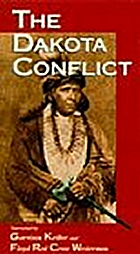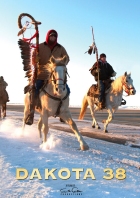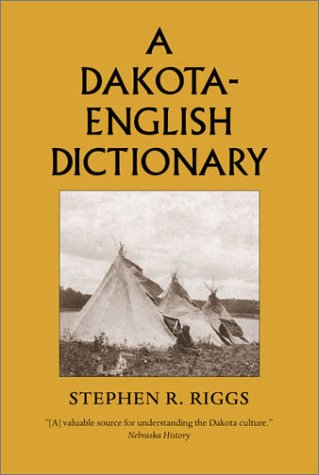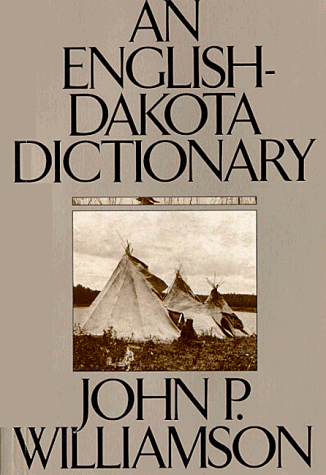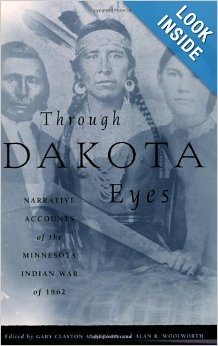

|
Through Dakota
Eyes edited by Gary Clayton Anderson
and Alan R. Woolworth.
This book has some
wonderful narratives from the very people who were caught up in the
middle of the uprising in Minnesota in 1862. The author does a good
job of explaining how the book is laid out. You definitely need to
read the intro to understand this. While I was reading the book, I
felt as though I was there in the middle of it with all those involved.
I don't excuse what was done, but I have a better understanding of
what horrors the indians went through that drove them to this place.
I would definitely recommend this book. By
Shelley Yeager
Paperback
- 316 pages Minnesota Historical Society; ISBN: 0873512162
I too would recommend
this book it has first hand narratives from people such as Big Eagle,
Samuel J. Brown, Charles R. Crawford, and Taopi. This book gives accounts
from the Dakota people who were there at the time. It continues each
person's story through different chapters which deal with various
time lines in the War. For instance Big Eagle gave a full account
of the whole 6 weeks, part of which is used in this book. This is
one of the first books I read on the 6 week war, back in the the late
1980's . . - Gloria
Hazell-Derby
|
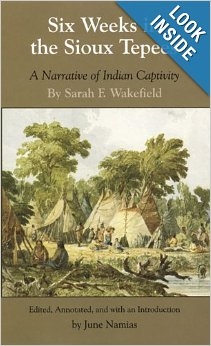

|
Six
Weeks in the Sioux Teepees by
Sarah F. Wakefield
Such
a lesson about the force of mass mentality on both sides of the Dakota
Uprising, the white settlers and army so unfair in the historical perspective.
Both the author and her captor, Chaska, had the courage to think for
themselves and respect each other as individuals. They are heroes in
my eyes and an inspiration, despite the tragedy. Well written first
person account. By kbester
Paperback
and hardback
ISBN-10: 0806134313
ISBN-13: 978-0806134314
I
first learned about this book while working on the Reconcilliation Committee
back in the 90's in Morton. Two of us (both white women as Sarah had
been) tried to get a pardon for Chaske from President Clinton, but we
didn't manage it. Had we managed it we would have tried for a pardon
for them all.. Gloria
Hazell-Derby
|
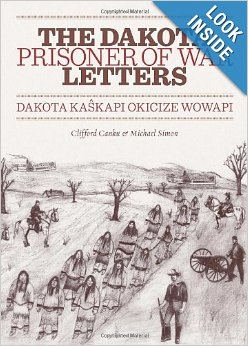

|
The Dakota Prisoner
of War Letters: Dakota Kaskapi Okicize Wowapi by Clifford
Canku
Enjoyed this book
as it is part of my history. Still reading it, as it is translated
in Dakota, Dakota English and English. This is a part of history that
I did not know about the other 276 being sent to Camp Kearney and
Camp McClellem. People who do not know about the 38 +2 Dakotah men
who were hung the day after Christmas in Minnesota need to read the
history. So many of our people were displaced to Lower Brule, Sisseton,
Yankton and Santee Reservations. The homeland of our people is Minnesota.
As a young person I used to wonder why there were so many streets
and places in Minnesota with Dakotah names. It wasn't until 1992 when
I saw the video on PBS, "The Dakota Conflict". A light bulb
went off in my head when they mentioned stuffing grass down the agent's
mouth. I was only 4 years old when my grandmother told all of us about
this. You see my ancestors were hungry and the Agent said they could
eat their own dung or grass. I'm wopida tanka to Clifford Canku and
others for taking on the task of translating these letters. It will
help many of us to take time in learning our language. Again
I thank Clifford Canku for bringing a part of history I knew nothing
about. I don't know if my 2nd great grandfather and grandmother went
to these camps. Their names are Hus'te and Oicobe. Sincerely,
Gerri GrosVenor
Paperback:
224 pages. Publisher: Minnesota Historical Society Press; 1 edition
(March 1, 2013)
ISBN-10: 087351873X ISBN-13: 978-0873518734
I only recently
got this book but it is, I feel, very powerful to be able to read
these letters. I know you will get a lot from them. Gloria Hazell-Derby
|
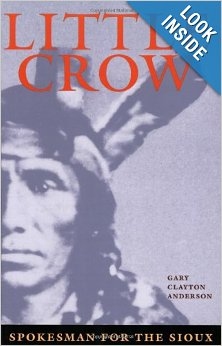
 |
Little Crow:
Spokesman For The Sioux by Gary Clayton Anderson
I live in the city
of Hutchinson, MN in McLeod County. Six miles north of this city is
a marker identifying the site where Little Crow was shot by a local
farmer. The farmer had no idea who he was shooting at, just that it
was an Indian and he would collect a bounty for his scalp.
Our city has a bronze statue of Little Crow looking out over the Crow
River near the dam on the Main Street. Up until the time that I read
this book, that summed up most of what I knew of Little Crow, the
Sioux legend. We choose to drop the name Sioux that was given this
people by our own ancestors, the Ojibwe. In our language it means
"Snake". Their word for themselves is Dakota. It means "Friend".
Now I feel as though I know him as a man. I know of his character,
his integrity, his family, his people. I know a great wrong was done.
At the present time there is a group of people involved in planning
and hosting a reconciliation and restitution concerning the events
that touched this city in regards to Taoyateduta (Little Crow) and
his people. A direct descendant of Taoyateduta (meaning His Red Nation)
and a direct descendant of the man who shot him will be part of the
event, asking forgiveness of one another. It is never too late to
say, "I'm sorry. Will you forgive?"
This book has been instrumental in opening the door to the healing
of this ancient wound that is still alive in many hearts. By
A Customer
I added that
recommendetion because of the healing that had taken place in this
person. I learned about Little Crow before I came to MN, I learned
that he had a physical disability, and that he was a very clever man.
I got this book in the early 90's and enjoyed reading about him. I
have visited his grave in Flandreau many times, smoking Pipe there
in ceremony a number of times. - Gloria Hazell-Derby
|
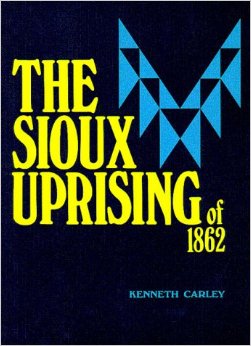

|
The
Sioux Uprising of 1862 by
Kenneth Carley
Also
known as the Dakota Conflict and the Dakota War of 1862, this bloody
and tragic episode in Minnesota's history was one of a series of Indian
wars on the Northern Plains that did not end until 1890 with the infamous
Battle of Wounded Knee in South Dakota.
This
book is out of print now but you can get used copies from $4.00 from
the Amazon site.
Paperback
- 102 pages (December 1976) Minnesota Historical Society; ISBN: 0873511034
I
have used this book a lot over the years for photos and information,
not as informative as 'Through Dakota Eyes' I still think it is one
worth having, especially at the used books price of today - Gloria
Hazell-Derby
|
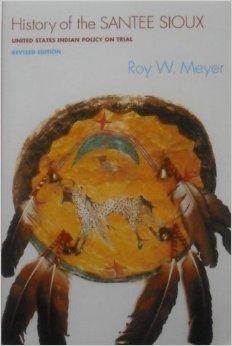

|
History
of the Santee Sioux: United States Indian Policy on Trial by
Roy W. Meyer
I found this book to be very informative. It gave great accounts from
both sides (Indian and non-indian). It follows the Santee Sioux history
starting with accounts from explorers who encountered these wonderful
people, to the Sioux Uprising, to their exile from their land, to the
present day. You will find yourself unable to put this book down.
By Shelley Yeager
Paperback
- 471 pages. Publisher: Univ of Nebraska Pr; Revised edition (September
1993) ISBN: 0803282036
This
book can be obtained for a used price of less than $3.00
One
of the first books I read on the Santee back in the 80's. I found it
to be very good. It's good to have a copy around if you want to do research.
- Gloria Hazell-Derby
|
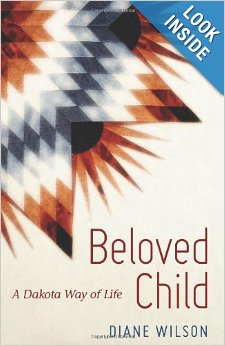
|
Beloved Child
- A Dakota Way of Life by
Diane Wilson
What a moving book
this is. Diane has chapters from several people who have given their
stories, including Clifford Canku and Gabrielle Tateyuskanskan
“Far greater
even than the loss of land, or the relentless coercion to surrender
cultural traditions, the deaths of over six hundred children by the
spring of 1864 were an unbearable tragedy. Nearly one hundred and
fifty years after the U.S.–Dakota War of 1862, Dakota people
are still struggling with the effects of this unimaginable loss.”
Hardcover:
224 pages. Publisher: Borealis Books; 1 edition (September 1, 2011)
ISBN-10: 0873518268 ISBN-13: 978-0873518260
I have known
Diane for a number of years, and I got this book a while ago but never
read it... until a few days ago. I was blown away by it. The way Diane
writes educates on a different level, on an emotional plane for those
of us who have had children. I think if this book is read by the younger
generation it may give them hope. With the suicide rate being so high,
we shake our heads in disbelief, with a sense of helplessness. If
the old ways of caring for our children is once again followed, these
young people would feel better about themselves. Traditional ways
were there for reasons, they covered all aspects of life, a good life,
for all members of the Tiospaye, Oyate, or Community. Children were
Beloved, they knew they were, and so acted accordingly. Those ways
should come back.. Thank you Diane for writing such a compelling book
- Gloria
Hazell-Derby
|
|
|
A
Dakota-English Dictionary (Borealis Books)
by
Stephen Return Riggs, James Owen Dorsey, Carolynn
I. Schommer
Paperback - 665 pages Reprint edition (Oct 1992) Minnesota Historical
Society; ISBN: 0873512820
We
used this and the following book in the Little Feather Center in Pipestone.
They are both written by the missionaries, Stephen Riggs, and John Williamson,
who were with the Dakota during the Conflict. Both of these men were
respected by the Dakota as they allowed them to keep their own culture,
yet taught them skills which would take them into the 20th century.
Instead of forcing the Santee to learn the Bible in English, they translated
it into Dakota. These two men were unique in their understanding of
the Dakota culture and spirituality. Gloria Hazell-Derby
|
|
|
An
English-Dakota Dictionary
(Borealis Books)
by John P. Williamson, Carolynn I. Schommer
Paperback - 264 pages Reprint edition (Oct 1992) Minnesota Historical
Society; ISBN: 0873512839
Please
see the above description.- Gloria
There
is also a Dakota Grammar book out now, (2004) by Stephen R. Riggs
|
